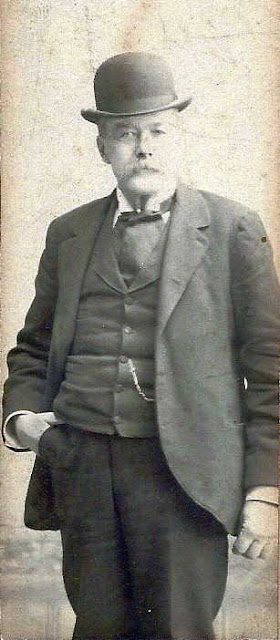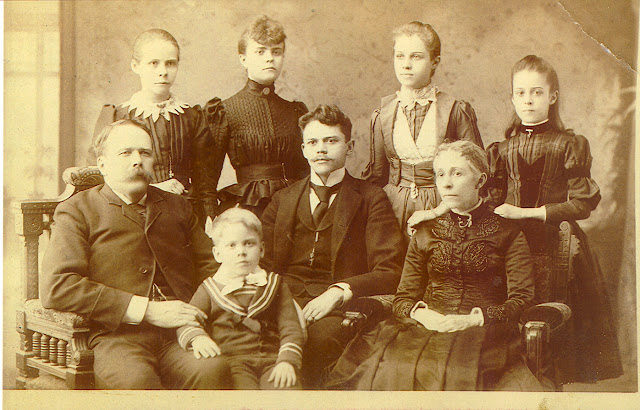Palmer Melander Wood
Heather’s 2nd
great grandfather
When Palmer
Melander Wood was born on January 18, 1839, in New York, his father,
Tillinghast, was 36 and his mother, Jemima, was 39. He married Jennie Mary Ward
in 1867 in Herkimer, New York. They had seven children in 15 years. He died on
December 18, 1900, in Herkimer, New York, at the age of 61, and was buried in
Jordanville, New York. He was a member of the Freemasons, Herkimer Lodge
No. 423. He invented and patented a type of bookbinding. He was involved in
politics and a number of scandals throughout his life. His innocence or guilt
in all of the said scandals was never definitively proven.
There was a
Federal census taken in 1840, a year after Palmer was born. But that census
only named heads of households. So the first time I find him named with his
family is in 1850. In this census he appears by his middle name Melander. The
family is living in Warren, Herkimer County, New York.
The family
also appears together in the 1855 New York State census, though it’s very faded
and hard to read. That census asked for birth counties, and that’s how we know
Palmer was born in Herkimer County. In that census he is listed with his first
name, Palmer.
In the 1860
Federal census he is still living with the family in Warren. Again he is listed
as Melander.
And in the
1865 New York state census, he is Palmer again. Still living in Warren with his
parents. In 1865 he is 26 years old, and his occupation is “farmer”.
I don’t have
an original source marriage record, but we have an estimate from what he
reported in the 1900 census, as well as the fact that oldest son Rinaldo was
born in April 1868. It appears that Palmer married Jennie Ward in 1867.
In 1868 he
appears as “P.M. Wood” next door to “T. Wood” (his father) in a really cool
land ownership map from Warren, Herkimer County, New York. Look for where I
circled in red. Also of note are the 2 properties belonging to “A. Ward” who is
“2 doors down” so to speak. This is Artemas Ward, who is Jennie Ward’s father.
I know this for sure because the names are all spelled out in the 1870 census,
only 2 years after this map was published.
I didn’t
copy the 1870 population census, but here is the agricultural census also taken
in 1870.
You can see
Tillinghast Wood’s info on the first row, followed by Palmer Wood. Artemas Ward
is at the bottom.
Reading the
fine print, we learn that Palmer owns 55 acres of land, 10 of which is woodland.
His land is worth $4000, his tools are worth $200, and he earned $200 in wages
the previous year. He owns 2 horses, 13 milch cows, 1 “other cattle”, 8 sheep,
and 2 swine. All of his livestock is valued at $1000. For produce, he grows
oats, barley, and buckwheat.
Here is his
family in the 1875 New York state census.
He now has 2
daughters in addition to his son Rinaldo Roscoe. His mother lives with him now,
because his father Tillinghast passed away, actually only about a week before
this census was recorded.
In 1879 he
is nominated to be county clerk. He is reported as (still) living in Warren.
This is from the New York Times.
Here is the
family in 1880. Palmer’s occupation is “county clerk”. Another daughter has
been born. The census location is no longer Warren, but now Herkimer proper,
within Herkimer County.
Though I
don’t know the address, a distant cousin (Eric Gloo) shared this incredible
photo which is probably the home they lived in in 1880. The family is standing
on the porch. Could this be 124 Prospect Street where son Ward lived for so
many years? This building is certainly large enough to be converted to a
duplex. See 2 separate entrances on the front of the building.
And since
Palmer is working as a county clerk, I was able to find his signature on a
court document. He wrote his title as “clerk of the Supreme Court”, I think.
This photo
was probably taken around 1880 as well. (This one was sent to me by cousin Lisa
Villiere.)
In 1881
Palmer and Jennie have a daughter Bessie, who dies that same year.
In 1884, son
Ward Palmer is born.
In 1885,
there is a reference to his farm back in Warren. This news article from The New
York Sun indicates that a human skull had been found in the woods on Palmer’s
property, presumably those 10 acres of woodland in Warren.
25 Nov 1887
– The New York Times
In this
article we learn that Palmer served as county clerk for 2 terms (roughly
1880-1886). And that after he left this position, he was accused of possibly
pocketing up to $5000 in excess fees, which I’m not clear if it was expense
report fraud or a sort of embezzlement. This issue would persist for several
years. I found a news article referencing this case in 1891, which we will see
later.
In April
1887, Palmer applies for a patent for a new type of bookbinding. The patent is
awarded in November 1888.
Full text of
the patent is here:
In 1888,
Palmer’s mother Jemima passes away.
Here’s a rerun
of the family portrait that I first put in son Ward Palmer’s biography.
Guessing it was taken around 1888 as well.
11 Oct 1891
– The New York Sun
This is an
obituary for a lawyer, and just happens to mention The People vs. ex-County Clerk Palmer M. Wood.
The full
case text can be found here:
And if I’m
reading this case text correctly, this is an appeal which reverses a previous
judgement against Palmer. In the original case he was found guilty, but it
sounds like he did not get a jury trial. The appellate court determined that he
should have either gotten a jury trial or that the state was at fault for
paying him the money.
And here’s a
repeat photo of the 1892 census (copied from son Ward Palmer’s biography):
Where
Palmer’s occupation has changed again, to “coal dealer”.
So then in
September 1893 that helps explain this New York Supreme Court case Ehrehart vs.
Wood, which was an appeal by Palmer. He was appealing a judgement against him
from January 1892 where Mr. Ehrehart says he sold Palmer some coal which I
guess Palmer didn’t fully pay for. I think Palmer was arguing that the Herkimer
Paper Company was supposed to pay for it. But the judgement went against Palmer
and he lost the appeal as well.
There’s also
an 1893 map of Mohawk, New York, that names Palmer M. Wood as a “Coal, Wood,
and Pipe Dealer”. A copy of the map can be purchased here. http://www.worldmapsonline.com/historicalmaps/1W-NY-MO-1893.htm
Palmer’s
business is #9 on the map, but I can’t make the image larger to be able to see
it.
18 Nov 1893
– The World (New York) reports that
Palmer is a candidate for clerk to the New York State Senate.
A few days
later, here’s another report from the same newspaper.
2 Jan 1894,
the New York Tribune prints that Palmer has gotten a job as deputy clerk of the
Assembly, at a salary of $1600/year.
On 12 Sep
1895, the New York Times reported something about the Herkimer Republican
Party, which I don’t really understand, but Palmer is a candidate or delegate that
is mentioned.
On 9 Oct
1895 Palmer is in more political hot water. A very lengthy article is published
on the front page of the New York Times. It indicates that there’s a place
called “The Farm” that is few miles outside of Herkimer city limits. This place
is run by a man named Tony Mackin, though Mr. Mackin does not own the property.
The newspaper uses a lot of words and descriptions that imply that “The Farm”
is a casino/bar/brothel. And evidently Palmer is the landlord. The property was
originally owned by a Mr. Tower, and when he passed away the rights went to his
son. But son Tower was determined to be insane, and so a “committee” to take
over the property was appointed by the New York court system. The committee was
only one person – our Palmer M. Wood.
Here is an excerpt from the article.
 |
Courtesy of
cousin Eric Gloo, again.
|
As we saw in
son Ward’s biography, in 1900 the family was living at 124 North Prospect
Street in Herkimer. And remember we learned that in later years this address
was a duplex that the family was renting. I wish I knew what happened between
that wonderful 1880 photo, and 1900. I wish I knew if the building in the photo
is actually 124 North Prospect Street. It’s certainly large enough to be
converted to a duplex. Did they sell the building after Palmer died? Or is 124
North Prospect Street a different address altogether.
We can also
see from this census that Palmer’s occupation is at a post office. This will be
referenced later in his obituary. It happens to be the New York City post
office, where he travels from his home in Herkimer. He got this job in March of
1900, as we learn in this news article. His name is in the last line, but I
clipped the whole article because it talks about the cashier’s salary
($2600/year) and also the culture of why people preferred post offices over
home delivery (in New York).
Early in
December 1900, he is “knocked down by a team” (I’m guessing horses) while in
New York city. This leads to his death on 18 December 1900.
17 Dec 1900
- The Evening World (New York)
From the Democrat and Chronicle from Rochester,
New York.
He was
buried in the family plot in Jordanville, New York. (Photo by Lisa Villiere.)
Eric Gloo provided
this wonderful letter that had been passed down in his family.
Lisa V.
provided this obituary, which I think was printed in the Herkimer Telegram.
It seems
Palmer did not leave a will. I found this probate record from July 1903 granting
all of Palmer’s “goods” to his widow, Jennie.




































No comments:
Post a Comment